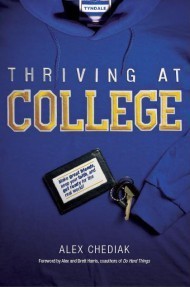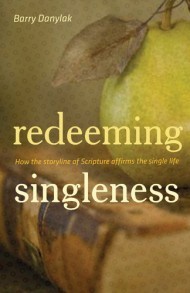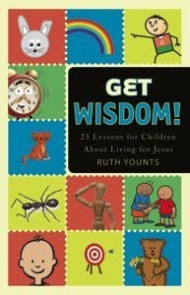Justin Taylor's Blog, page 344
March 29, 2011
How to Survive, and Thrive, at College
 Alex Chediak has a nice new book out from Tyndale entitled Thriving at College. From what I've seen of the book, it's probably the first book I'd recommend for students going off to college.
Alex Chediak has a nice new book out from Tyndale entitled Thriving at College. From what I've seen of the book, it's probably the first book I'd recommend for students going off to college.
Here's what some others are saying:
Jerry Bridges: "It will be an excellent gift for all high school seniors who are planning to attend college."
Randy Alcorn: "I recommend it wholeheartedly not only to young people but also to their parents and church leaders."
Tedd Tripp: "This book is a 'must read' for kids headed to college as well as students who are already there."
You can sample a bit of the book online for free:
Table of Contents
Read the Foreword by Alex and Brett Harris
Read the Preface
Read an Excerpt
There's a lot packed into this book, and it sells for under $10.
New Free Pre-Conference Roundtable at TGC on Church Planting

Crossway is sponsoring a pre-conference event at The Gospel Coalition, called God-Given Growth. It's on Tuesday, April 12, from 9:00-11:30am at McCormick Place in Chicago. It's free and open to the public. From the Crossway blog:
If you're a pastor, planter, potential planter, or lay leader, join us for a time of teaching and discussion that will celebrate God's work to advance his gospel through launching and relaunching Christ-centered churches.
The roundtable discussion, moderated by Scott Kauffmann, will feature four pastors with decades of combined planting, re-planting, and pastoring experience. Darrin Patrick, Dave Harvey, Mike McKinley, and Tullian Tchividjian will cover the church leader's mission, calling, practices, and prayer.
Be sure to come with questions for the round table Q&A.
March 28, 2011
The Most Important Religious-Freedom Case in 20 Years
Notre Dame law professor Rick Garnett thinks that Hosanna-Tabor Evangelical Lutheran Church and School v. EEOC is the most important religious-freedom case before the Supreme Court in 20 years.
At issue is whether or not antidiscrimination laws allow the courts to review hiring-and-firing decisions made by parochial schools with respect to teachers who teach primarily secular subjects. Given the subject matter of their teaching, a lower court has ruled that such teachers are not "ministerial employees."
HT: Joe Carter
Allah: A Christian Response
A careful, thoughtful review of Miroslav Volf's new book, Allah: A Christian Response (HarperOne, 2011).
D. Michael Lindsay: New President of Gordon College
 D. Michael Lindsay—named in 2006 the most promising sociologist in the world under the age of 35 by the World Congress of Sociology and the author in 2007 of the Pultizer Prize nominated Faith in the Halls of Power: How Evangelicals Joined the American Elite—has been named the new president of Gordon College.
D. Michael Lindsay—named in 2006 the most promising sociologist in the world under the age of 35 by the World Congress of Sociology and the author in 2007 of the Pultizer Prize nominated Faith in the Halls of Power: How Evangelicals Joined the American Elite—has been named the new president of Gordon College.
Timothy Dalrymple has the first interview.
March 27, 2011
Christ and City 2011: A Call to Renewal (Free Event after TGC)

"Join urban movement leaders Tim Keller, Eric Mason, Darrin Patrick, Jeff Vanderstelt, Makoto Fujimura, Lecrae and others for a unique half-day catalytic conference calling us to the renewal of our cities."
More info here.
On Bias Against Single Pastors
Steve DeWit, who is single and is a pastor, pens a poignant article at TGC on the issue of single pastors, sparked by a recent NYT piece on the subject.
Albert Mohler also blogged about this, but from a different perspective.
But I found Pastor DeWit's observations on 1 Timothy 3 persuasive:
Arguments that cast Paul as prioritizing marriage in ministry wrongly make the helpful reality of marriage a biblical preference. It is important to note that the pastoral qualifications in 1 Timothy 3 were written by a single apostle (perhaps a widow or even a divorcee but nevertheless single). Would Paul write qualifications that handicapped himself as a pastor? Further, we have no indication that Timothy and Titus were married. Yet they are charged with identifying and laying hands on elders who would serve under their leadership. It seems that what is good for the apostolic goose should be good enough for the pastoral gander.
Finally, if we affirm that 1 Timothy 3 teaches that marriage is a near requirement for pastors/elders, in order to be consistent we would need to require a pastor to have children as well. Taken one step further, he would have to have more than one child since "children" is plural. This is all unnecessary and unwarranted. Paul is simply describing how a pastor/elder must be faithful to his wife IF he is married, and he is describing the quality of a pastor's parenting and leadership IF he has children.
And I found this section from Pastor DeWit to be especially moving:
Every married pastor would affirm that a godly wife is a wonderful blessing both personally and pastorally. We should recognize and celebrate that a married pastor's marriage is a tremendous asset in both his personal growth into holiness and the resources it generates for shepherding a flock.
But we must also recognize that a pastor's singleness is equally valuable in different ways. Speaking from experience, singleness has its own anvil on which God shapes character and pastoral gravitas. In addition, single pastors have some tremendous gifts to share with their congregations. When I speak of my loneliness, how many hearts leap with hope identifying with my trial? When my voice quivers as I describe life lived with unmet and unfulfilled expectations, what heart can't hear the echo? A normal red-blooded, sexual, single, Christian man battling all the normal desires yet pursing contentment in Christ is a living sermon that Jesus alone is sufficient. These strengths, combined with the greater energy and time that single pastors can pour into their churches, should lead us to conclude that singleness ought not be viewed as a negative. If Paul was serving on the search committee, I think he'd argue for it as a positive.
Read the whole thing here.
 It's worth noting that this is a subject where biblical theology can be enormously helpful, and no one has done more insightful work on the issue from this angle thanBarry Danylak in
Redeeming Singleness: How the Storyline of Scripture Affirms the Single Life
(Crossway, 2010). It may be worth reprinting again John Piper's foreword, which provides a helpful summary:
It's worth noting that this is a subject where biblical theology can be enormously helpful, and no one has done more insightful work on the issue from this angle thanBarry Danylak in
Redeeming Singleness: How the Storyline of Scripture Affirms the Single Life
(Crossway, 2010). It may be worth reprinting again John Piper's foreword, which provides a helpful summary:* * *
The greatest, wisest, most fully human person who has ever lived, never married. Jesus Christ. His greatest apostle never married, and was thankful for his singleness. Jesus himself said, that in the age to come we do not marry. And he added that the age to come had already broken into this world.
Therefore, the presence of single people in the church not only "attests the sufficiency of Christ for the reception of God's covenantal blessings in the new covenant," but also reminds us "that the spiritual age has already been inaugurated in Christ and awaits imminent consummation."
When I met Barry Danylak at Tyndale House in Cambridge, England, in the summer of 2006, I was amazed at the research he was doing on a biblical theology of singleness. Not only was the scope of it unprecedented, but the theological and practical insights struck me as biblically compelling and practically urgent. I don't know of anyone else who has ever provided the extent of biblical reflection on singleness that Barry has provided for us here.
Both marriage and singleness demand the most serious and solid biblical insight. These are realities that affect every area of our life and thought. We cannot settle for superficial pep talks. Our lives cry out for significance. And significance comes from seeing ourselves the way God sees us. Including our singleness. My guess is that virtually every single who reads this book will finish with a sense of wonder at who they are, and how little they knew about this gift and calling.
Barry is keenly aware of the progress of redemptive history and its stunning implications for the single life. Early in that history, marriage and physical children were fundamental to the blessings of the Mosaic Covenant. But they are not fundamental to the New Covenant the way they were then. And what is beautiful about the way Barry develops this historical flow is that the glory of Jesus Christ is exalted above all things.
Barry elevates but does not absolutize the calling of the single life. It's greatness lies in this: "It is a visible reminder that the kingdom of God points to a reality which stands beyond worldly preoccupations of marriage, family and career." Indeed. And that greater reality is the all-satisfying, everlasting friendship of Jesus himself in the new heavens and the new earth. Marriage and singleness will be transcended, and Christ himself will make those categories obsolete in the joy of his presence. A life of joyful singleness witnesses to this.
Free Will: A Primer
An outline of the chapter on free will in Robert Peterson's Election and Free Will: God's Gracious Choice and Our Responsibility.
Free Will and the Bible's Story
Human beings as created had true freedom and freedom of choice.
Human being as fallen lost true freedom and retained freedom of choice.
Human beings as redeemed have regained a measure of true freedom and retained freedom of choice.
Human beings as glorified will be perfected in true freedom and will retain freedom of choice.
True freedom = "the ability to love and serve God unhindered by sin" (p. 131).
Freedom of choice or spontaneity = "the ability of human beings to do as they wish" (p. 126)
Free Will and Reasons Why People Are Saved and Condemned
1. Reasons why people are saved
a. People are saved because they trust Christ as Lord and Savior.
b. People are saved because the Holy Spirit opens their hearts to the Gospel.
c. People are saved because Christ died and rose to save them.
d. People are saved because the Father chose them for salvation before creation.
2. Reasons why people are condemned
a. People are condemned because of their actual sin.
b. People are condemned because of Adam's original sin.
c. People are condemned because God passed over them (reprobation).
Free Will and Its Relation to God's Sovereignty
1. The Bible affirms both divine sovereignty and genuine human responsibility.
a. The Bible affirms divine sovereignty.
b. The Bible affirms genuine human responsibility.
c. The Bible affirms divine sovereignty and human responsibility together.
2. Parameters for sovereignty and responsibility.
a. Fatalism must be rejected as an error.
b. Absolute power to the contrary must be rejected as an error.
3. To emphasize either sovereignty or responsibility at the expense of the other is to fall into the error of rationalism.
a. Hyper-Calvinism is an error.
b. Arminianism is an error.
March 25, 2011
23 Lessons for Children about Living for Jesus
Ruth Younts has produced a wisdom character manual like I have never seen before.
Forget that it was written for children, I need it!
I wish I had been given such a fun, street-level and Christ-centered tool when my children were still at home.
By the way, Ruth isn't able to talk about wisdom with such practicality and grace because she did graduate work in wisdom. No, Ruth has spent years at the feet of her Heavenly Father listening. She knows that he is not only the source of all true wisdom, but is Wisdom himself.
You can read some sample pages and more information about the book here: Get Wisdom! 23 Lessons for Children about Living for Jesus.
A Woman of Whom the World Was Not Worthy
The Guardian eulogizes Mary Gardner, killed by a bombing in Jerusalem. Serving with Wycliffe Translators, she dedicated twenty years of her life to translating the New Testament into the local Ifé language for the Togo people of west Africa.
Another life well lived for the glory of God in Christ.
HT: David Reimer
Justin Taylor's Blog
- Justin Taylor's profile
- 44 followers














